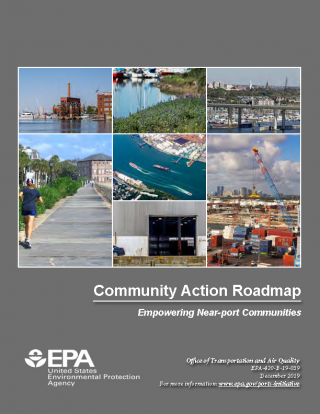Community-Port Collaboration Toolkit
The Community-Port Collaboration Toolkit is designed to help communities and ports develop collaboration skills and to enhance understanding of stakeholders’ priorities and challenges associated with port-related activities. The Toolkit includes the Ports Primer for Communities, and the Community Action Roadmap along with associated training materials and worksheets. The tools were developed through a collaborative process with feedback from port operators, communities, non-profit organizations and government agencies as recommended by the Ports Initiative Workgroup Report (pdf) (1.3 MB, September 2016 );and approved by the Mobile Sources Technical Review Subcommittee of the Clean Air Act Advisory Committee. The Ports Primer and Community Action Roadmap support enhancement of community skills for building partnerships and effectively engaging in local decision-making.
Overarching Considerations
Near-port communities and port operators typically have unique challenges and shared interests related to air quality that can benefit from joint problem solving. Ports operating around the U.S. vary in size and settings, handle different commodities, serve different markets, and provide different services. Likewise, near-port communities across the U.S. have specific and distinctive histories, cultures, land use legacies, political contexts, languages, and community goals, priorities and aspirations.
The Toolkit provides an overview of the common challenges and opportunities facing port operators and near-port communities and a framework of tools and strategies to address these challenges. However, each port or near-port community may choose how to best apply these tools based on collaborative dialogue and a shared understanding of unique environmental, economic, land use, transportation, goods movement, and quality-of-life challenges.
Understanding the scope of port and port-related business activities, along with identifying and engaging with near-port stakeholders most impacted by port operations are key for developing shared solutions. Exercises in the Toolkit provide insights and direction for port operators and community stakeholders to collaboratively design approaches that consider local dynamics.
The Training Facilitators Resource for Community-Port Collaboration Toolkit (WORD) (docx) provides information for getting started with training, determining what audience each tool is best suited for, training duration options for each tool, and sample agendas for training based on varying durations.
Ports Primer for Communities

The Ports Primer for Communities is an interactive reference document focused on seaports, however, much of the content can apply to other intermodal facilities such as inland ports and airports that have associated near-port communities. The Ports Primer characterizes the port industry sector including the following topics.
- The Role of Ports
- How Ports Work
- Port-Community Relations
- Ports impacts on land use and transportation
- Ports impacts on the local and regional economy
- Environmental Impacts of ports on climate, air, water, and human health
The Ports Primer also includes tools and resources for communities including scientific data and research, and information on citizen science projects. Below are links to the Ports Primer, the associated training module and the training facilitators resource.
- Ports Primer for Communities: An Overview of Ports Planning and Operations to Support Community Participation
- Training Module 1: Ports Primer for Communities (pptx)
- Módulo de capacitación 1: Manual básico de puertos para las comunidades (pptx)
Community Action Roadmap

The Community Action Roadmap that provides a step-by-step process for building community capacity to effectively engage in port decisions that may impact local land use, environmental health and quality of life. It is an implementation companion for the Ports Primer for Communities and includes specific references to the Ports Primer to help readers jump to information that would be helpful at each roadmap step. The six key steps for effectively engaging in local decision-making outlined in the Community Action Roadmap are:
- Prioritizing goals and concerns
- Identifying levers for change
- Building relationships
- Developing an action plan
- Making an action plan
- Building momentum for change
The Community Action Roadmap also includes an appendix with links to community resource publications. Below are links to the Community Action Roadmap, the associated training module and the training facilitators resource.
